Report on Interpersonal Skills: Self-Reflection and Development Plan
VerifiedAdded on 2022/09/22
|11
|2594
|48
Report
AI Summary
This report delves into the critical importance of interpersonal skills within a leadership and management context. It begins with a comprehensive literature review defining interpersonal skills, exploring relevant theories like Communication Pragmatics and Uncertainty Reduction theory, and examining how these skills impact organizational success. The report then presents a self-analysis and reflection, utilizing emotional intelligence assessments and personal anecdotes to evaluate the student's interpersonal abilities, particularly in conflict resolution and client interaction. The analysis highlights areas for improvement, such as empathy and active listening. Finally, an action plan is proposed, outlining specific objectives, actions, resources, and target dates for developing these crucial interpersonal skills, ultimately aiming to enhance communication, teamwork, and leadership effectiveness. This report is a valuable resource for students seeking to understand and improve their interpersonal competencies.
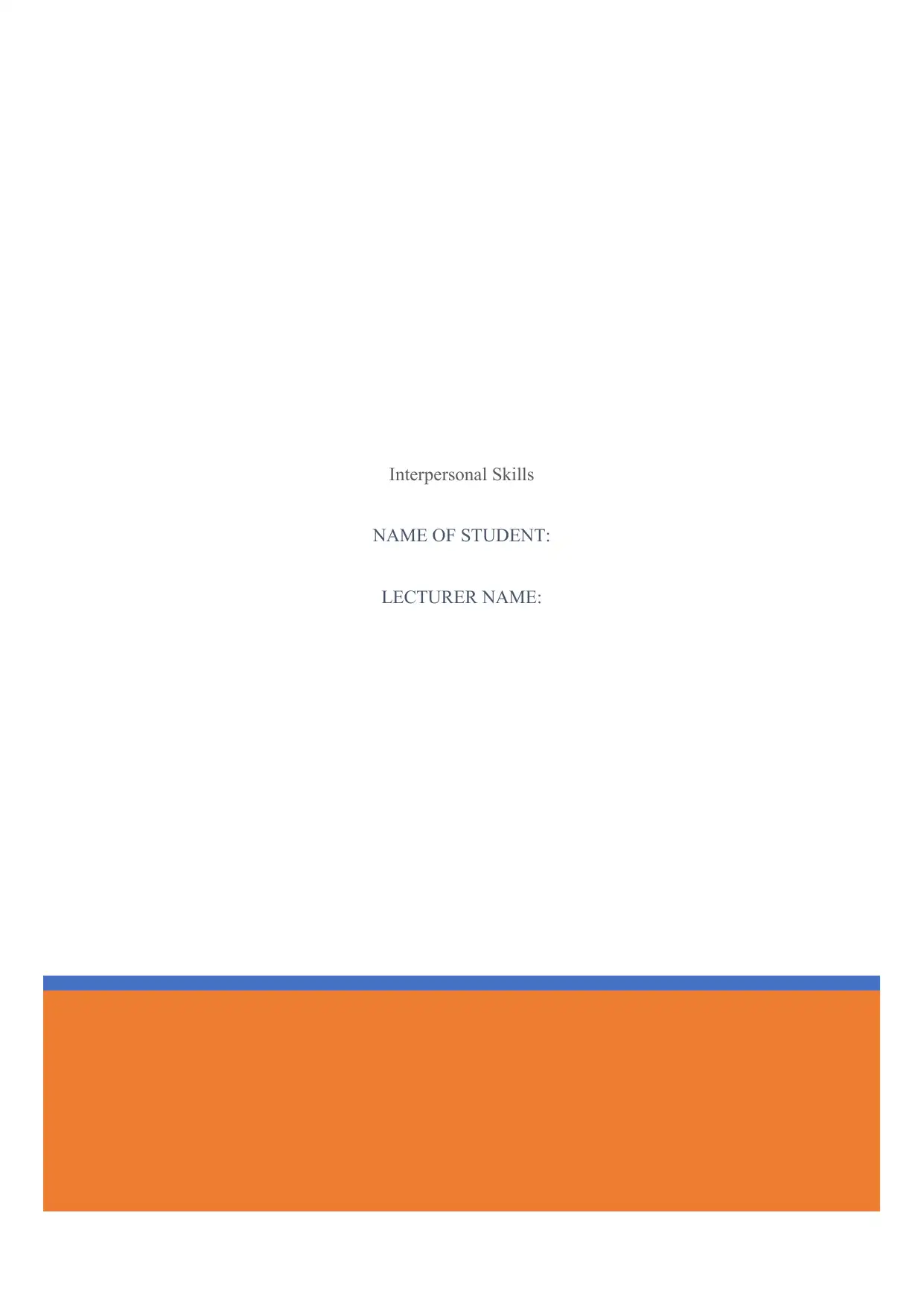
Interpersonal Skills
NAME OF STUDENT:
LECTURER NAME:
NAME OF STUDENT:
LECTURER NAME:
Paraphrase This Document
Need a fresh take? Get an instant paraphrase of this document with our AI Paraphraser

Contents
Introduction...........................................................................................................................................2
Literature review...................................................................................................................................2
Self-analysis/-reflection.........................................................................................................................5
Action plan for development.................................................................................................................8
Conclusion.............................................................................................................................................9
1
Introduction...........................................................................................................................................2
Literature review...................................................................................................................................2
Self-analysis/-reflection.........................................................................................................................5
Action plan for development.................................................................................................................8
Conclusion.............................................................................................................................................9
1
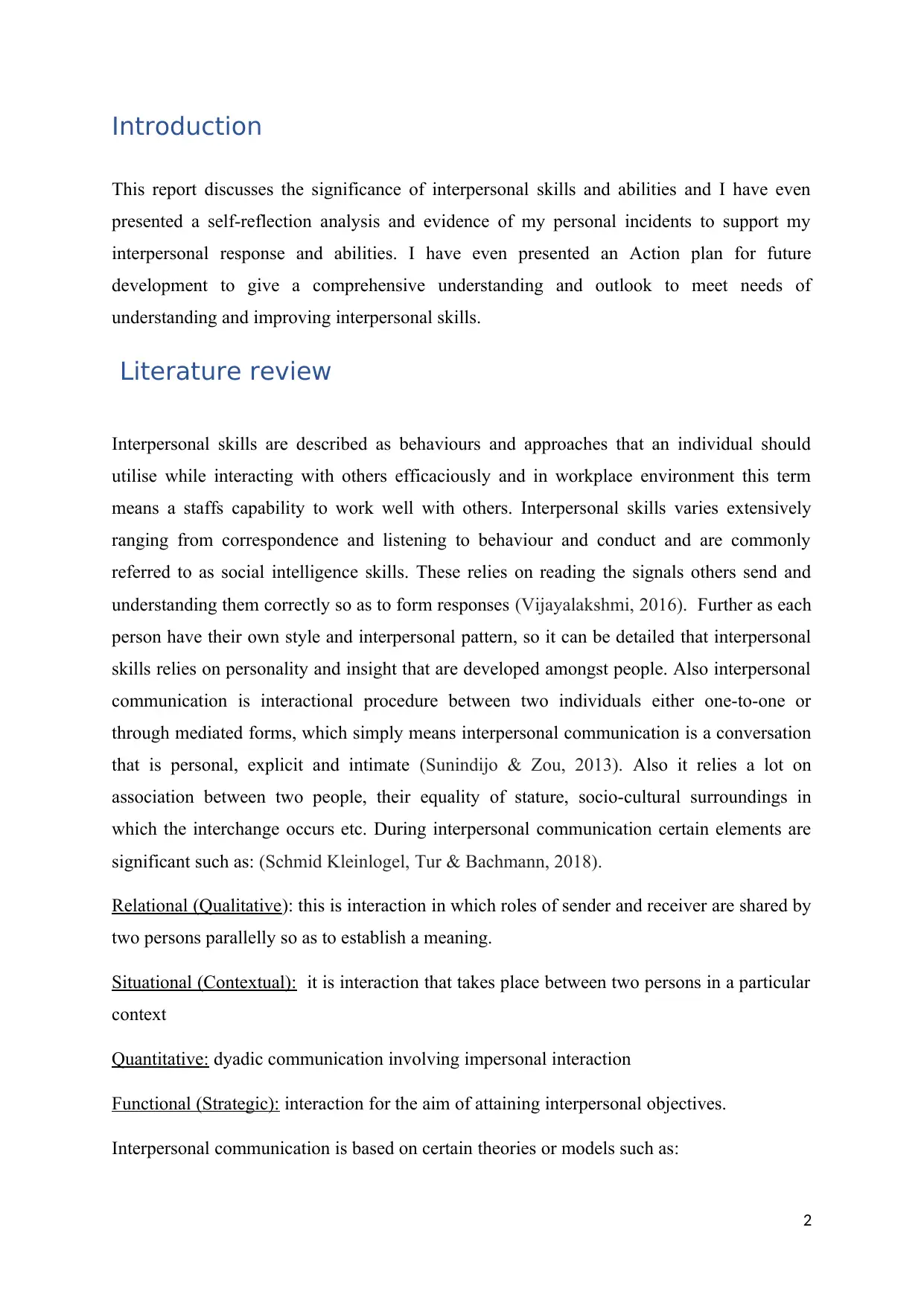
Introduction
This report discusses the significance of interpersonal skills and abilities and I have even
presented a self-reflection analysis and evidence of my personal incidents to support my
interpersonal response and abilities. I have even presented an Action plan for future
development to give a comprehensive understanding and outlook to meet needs of
understanding and improving interpersonal skills.
Literature review
Interpersonal skills are described as behaviours and approaches that an individual should
utilise while interacting with others efficaciously and in workplace environment this term
means a staffs capability to work well with others. Interpersonal skills varies extensively
ranging from correspondence and listening to behaviour and conduct and are commonly
referred to as social intelligence skills. These relies on reading the signals others send and
understanding them correctly so as to form responses (Vijayalakshmi, 2016). Further as each
person have their own style and interpersonal pattern, so it can be detailed that interpersonal
skills relies on personality and insight that are developed amongst people. Also interpersonal
communication is interactional procedure between two individuals either one-to-one or
through mediated forms, which simply means interpersonal communication is a conversation
that is personal, explicit and intimate (Sunindijo & Zou, 2013). Also it relies a lot on
association between two people, their equality of stature, socio-cultural surroundings in
which the interchange occurs etc. During interpersonal communication certain elements are
significant such as: (Schmid Kleinlogel, Tur & Bachmann, 2018).
Relational (Qualitative): this is interaction in which roles of sender and receiver are shared by
two persons parallelly so as to establish a meaning.
Situational (Contextual): it is interaction that takes place between two persons in a particular
context
Quantitative: dyadic communication involving impersonal interaction
Functional (Strategic): interaction for the aim of attaining interpersonal objectives.
Interpersonal communication is based on certain theories or models such as:
2
This report discusses the significance of interpersonal skills and abilities and I have even
presented a self-reflection analysis and evidence of my personal incidents to support my
interpersonal response and abilities. I have even presented an Action plan for future
development to give a comprehensive understanding and outlook to meet needs of
understanding and improving interpersonal skills.
Literature review
Interpersonal skills are described as behaviours and approaches that an individual should
utilise while interacting with others efficaciously and in workplace environment this term
means a staffs capability to work well with others. Interpersonal skills varies extensively
ranging from correspondence and listening to behaviour and conduct and are commonly
referred to as social intelligence skills. These relies on reading the signals others send and
understanding them correctly so as to form responses (Vijayalakshmi, 2016). Further as each
person have their own style and interpersonal pattern, so it can be detailed that interpersonal
skills relies on personality and insight that are developed amongst people. Also interpersonal
communication is interactional procedure between two individuals either one-to-one or
through mediated forms, which simply means interpersonal communication is a conversation
that is personal, explicit and intimate (Sunindijo & Zou, 2013). Also it relies a lot on
association between two people, their equality of stature, socio-cultural surroundings in
which the interchange occurs etc. During interpersonal communication certain elements are
significant such as: (Schmid Kleinlogel, Tur & Bachmann, 2018).
Relational (Qualitative): this is interaction in which roles of sender and receiver are shared by
two persons parallelly so as to establish a meaning.
Situational (Contextual): it is interaction that takes place between two persons in a particular
context
Quantitative: dyadic communication involving impersonal interaction
Functional (Strategic): interaction for the aim of attaining interpersonal objectives.
Interpersonal communication is based on certain theories or models such as:
2
⊘ This is a preview!⊘
Do you want full access?
Subscribe today to unlock all pages.

Trusted by 1+ million students worldwide
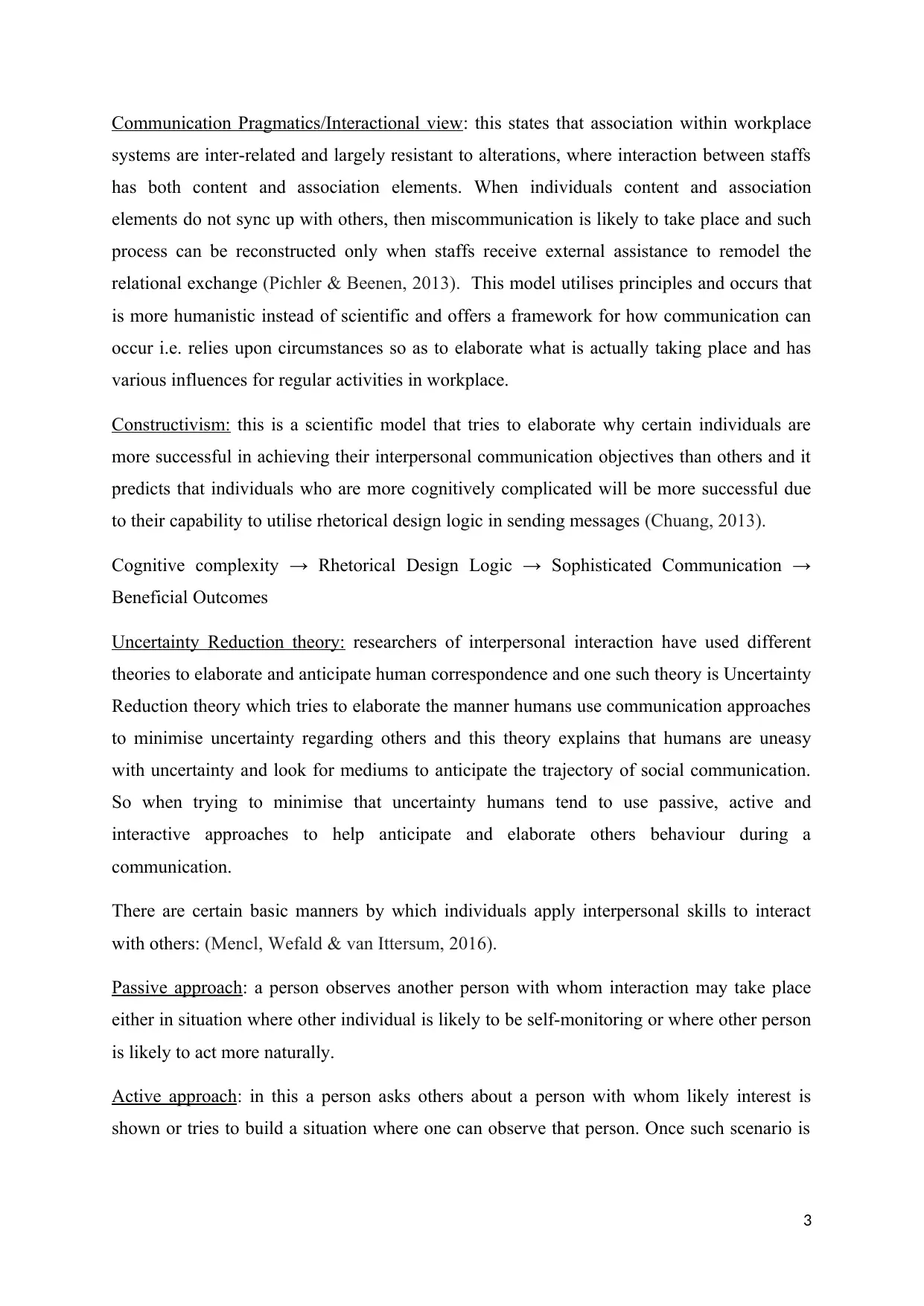
Communication Pragmatics/Interactional view: this states that association within workplace
systems are inter-related and largely resistant to alterations, where interaction between staffs
has both content and association elements. When individuals content and association
elements do not sync up with others, then miscommunication is likely to take place and such
process can be reconstructed only when staffs receive external assistance to remodel the
relational exchange (Pichler & Beenen, 2013). This model utilises principles and occurs that
is more humanistic instead of scientific and offers a framework for how communication can
occur i.e. relies upon circumstances so as to elaborate what is actually taking place and has
various influences for regular activities in workplace.
Constructivism: this is a scientific model that tries to elaborate why certain individuals are
more successful in achieving their interpersonal communication objectives than others and it
predicts that individuals who are more cognitively complicated will be more successful due
to their capability to utilise rhetorical design logic in sending messages (Chuang, 2013).
Cognitive complexity → Rhetorical Design Logic → Sophisticated Communication →
Beneficial Outcomes
Uncertainty Reduction theory: researchers of interpersonal interaction have used different
theories to elaborate and anticipate human correspondence and one such theory is Uncertainty
Reduction theory which tries to elaborate the manner humans use communication approaches
to minimise uncertainty regarding others and this theory explains that humans are uneasy
with uncertainty and look for mediums to anticipate the trajectory of social communication.
So when trying to minimise that uncertainty humans tend to use passive, active and
interactive approaches to help anticipate and elaborate others behaviour during a
communication.
There are certain basic manners by which individuals apply interpersonal skills to interact
with others: (Mencl, Wefald & van Ittersum, 2016).
Passive approach: a person observes another person with whom interaction may take place
either in situation where other individual is likely to be self-monitoring or where other person
is likely to act more naturally.
Active approach: in this a person asks others about a person with whom likely interest is
shown or tries to build a situation where one can observe that person. Once such scenario is
3
systems are inter-related and largely resistant to alterations, where interaction between staffs
has both content and association elements. When individuals content and association
elements do not sync up with others, then miscommunication is likely to take place and such
process can be reconstructed only when staffs receive external assistance to remodel the
relational exchange (Pichler & Beenen, 2013). This model utilises principles and occurs that
is more humanistic instead of scientific and offers a framework for how communication can
occur i.e. relies upon circumstances so as to elaborate what is actually taking place and has
various influences for regular activities in workplace.
Constructivism: this is a scientific model that tries to elaborate why certain individuals are
more successful in achieving their interpersonal communication objectives than others and it
predicts that individuals who are more cognitively complicated will be more successful due
to their capability to utilise rhetorical design logic in sending messages (Chuang, 2013).
Cognitive complexity → Rhetorical Design Logic → Sophisticated Communication →
Beneficial Outcomes
Uncertainty Reduction theory: researchers of interpersonal interaction have used different
theories to elaborate and anticipate human correspondence and one such theory is Uncertainty
Reduction theory which tries to elaborate the manner humans use communication approaches
to minimise uncertainty regarding others and this theory explains that humans are uneasy
with uncertainty and look for mediums to anticipate the trajectory of social communication.
So when trying to minimise that uncertainty humans tend to use passive, active and
interactive approaches to help anticipate and elaborate others behaviour during a
communication.
There are certain basic manners by which individuals apply interpersonal skills to interact
with others: (Mencl, Wefald & van Ittersum, 2016).
Passive approach: a person observes another person with whom interaction may take place
either in situation where other individual is likely to be self-monitoring or where other person
is likely to act more naturally.
Active approach: in this a person asks others about a person with whom likely interest is
shown or tries to build a situation where one can observe that person. Once such scenario is
3
Paraphrase This Document
Need a fresh take? Get an instant paraphrase of this document with our AI Paraphraser
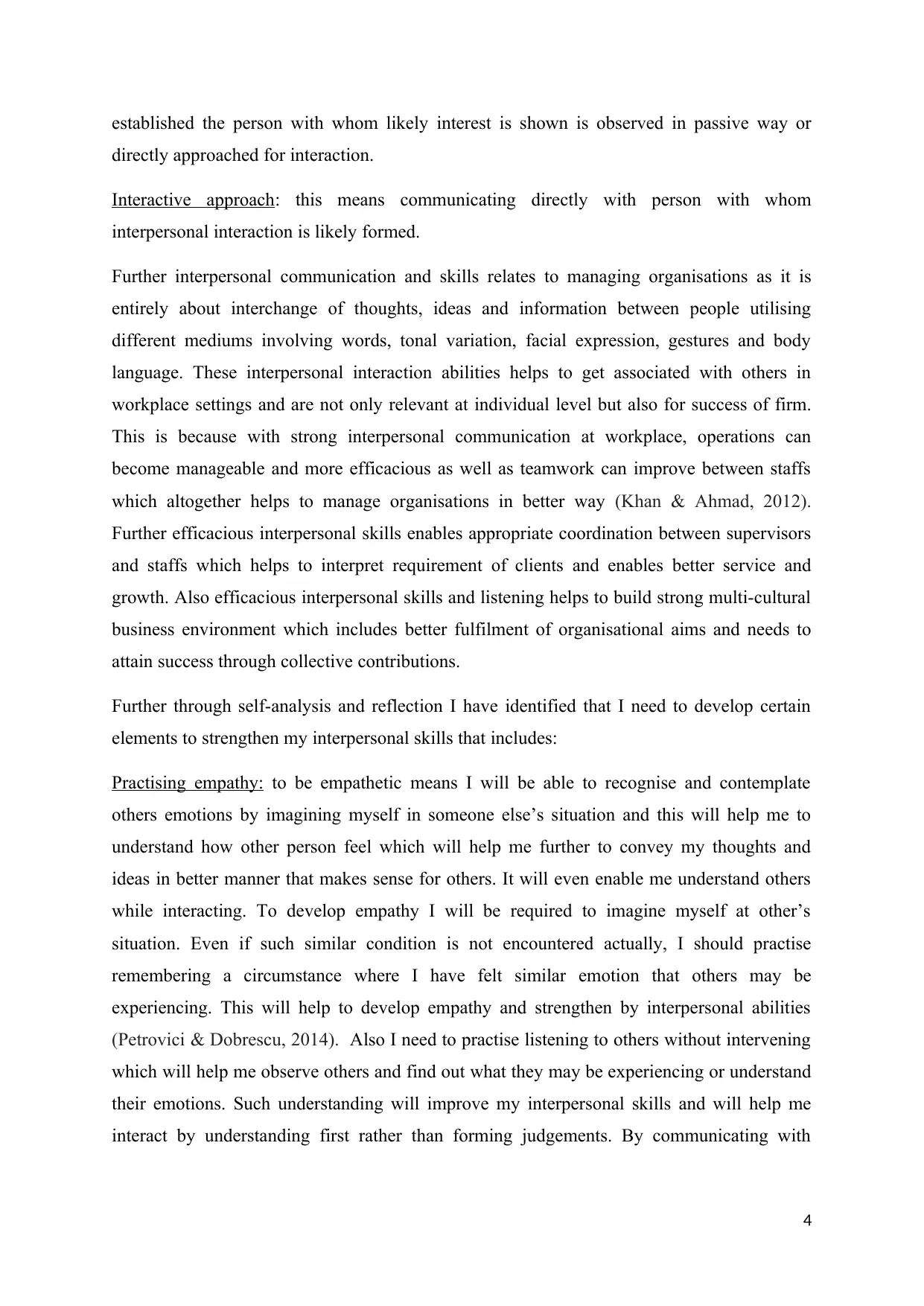
established the person with whom likely interest is shown is observed in passive way or
directly approached for interaction.
Interactive approach: this means communicating directly with person with whom
interpersonal interaction is likely formed.
Further interpersonal communication and skills relates to managing organisations as it is
entirely about interchange of thoughts, ideas and information between people utilising
different mediums involving words, tonal variation, facial expression, gestures and body
language. These interpersonal interaction abilities helps to get associated with others in
workplace settings and are not only relevant at individual level but also for success of firm.
This is because with strong interpersonal communication at workplace, operations can
become manageable and more efficacious as well as teamwork can improve between staffs
which altogether helps to manage organisations in better way (Khan & Ahmad, 2012).
Further efficacious interpersonal skills enables appropriate coordination between supervisors
and staffs which helps to interpret requirement of clients and enables better service and
growth. Also efficacious interpersonal skills and listening helps to build strong multi-cultural
business environment which includes better fulfilment of organisational aims and needs to
attain success through collective contributions.
Further through self-analysis and reflection I have identified that I need to develop certain
elements to strengthen my interpersonal skills that includes:
Practising empathy: to be empathetic means I will be able to recognise and contemplate
others emotions by imagining myself in someone else’s situation and this will help me to
understand how other person feel which will help me further to convey my thoughts and
ideas in better manner that makes sense for others. It will even enable me understand others
while interacting. To develop empathy I will be required to imagine myself at other’s
situation. Even if such similar condition is not encountered actually, I should practise
remembering a circumstance where I have felt similar emotion that others may be
experiencing. This will help to develop empathy and strengthen by interpersonal abilities
(Petrovici & Dobrescu, 2014). Also I need to practise listening to others without intervening
which will help me observe others and find out what they may be experiencing or understand
their emotions. Such understanding will improve my interpersonal skills and will help me
interact by understanding first rather than forming judgements. By communicating with
4
directly approached for interaction.
Interactive approach: this means communicating directly with person with whom
interpersonal interaction is likely formed.
Further interpersonal communication and skills relates to managing organisations as it is
entirely about interchange of thoughts, ideas and information between people utilising
different mediums involving words, tonal variation, facial expression, gestures and body
language. These interpersonal interaction abilities helps to get associated with others in
workplace settings and are not only relevant at individual level but also for success of firm.
This is because with strong interpersonal communication at workplace, operations can
become manageable and more efficacious as well as teamwork can improve between staffs
which altogether helps to manage organisations in better way (Khan & Ahmad, 2012).
Further efficacious interpersonal skills enables appropriate coordination between supervisors
and staffs which helps to interpret requirement of clients and enables better service and
growth. Also efficacious interpersonal skills and listening helps to build strong multi-cultural
business environment which includes better fulfilment of organisational aims and needs to
attain success through collective contributions.
Further through self-analysis and reflection I have identified that I need to develop certain
elements to strengthen my interpersonal skills that includes:
Practising empathy: to be empathetic means I will be able to recognise and contemplate
others emotions by imagining myself in someone else’s situation and this will help me to
understand how other person feel which will help me further to convey my thoughts and
ideas in better manner that makes sense for others. It will even enable me understand others
while interacting. To develop empathy I will be required to imagine myself at other’s
situation. Even if such similar condition is not encountered actually, I should practise
remembering a circumstance where I have felt similar emotion that others may be
experiencing. This will help to develop empathy and strengthen by interpersonal abilities
(Petrovici & Dobrescu, 2014). Also I need to practise listening to others without intervening
which will help me observe others and find out what they may be experiencing or understand
their emotions. Such understanding will improve my interpersonal skills and will help me
interact by understanding first rather than forming judgements. By communicating with
4

empathy I will be able to practise mindfulness and be able to handle different situations at
work.
Further key competencies required to improve interpersonal skills along with empathy
includes focus over developing cooperation with others which is significant part of
interpersonal skills at workplace. Even though every staff may have his/her own individual
tasks and objectives, but overall team has similar objectives and without cooperation, it is not
possible to attain those goals successfully (Phiri, Bano & Raouf, 2019). Thus while starting
interpersonal interactions in groups, I will focus on collaboration and cooperation aspects by
insuring to understand other persons expectations as well as communicating mine so that
each of us would be able to share ideas to encourage enhanced sharing and collaborating.
Another aspect which I will need to focus is showing respect to others at work so that even
others may show respect for me. This will improve interpersonal interaction and association
by being polite and applying mannerism(Petrovici & Dobrescu, 2014). Such great attitude
will help me share positive attitude with others and manage good relations at work. The scope
of learning and practicing empathy will help me acquire leadership behaviour as I will be
able to interpret other person’s conditions, perceptions and feeling from my own outlook and
this will improve and make me communicate better by understanding others (Sachdeva &
Singh, 2017). Developing empathy is essential skills for me to acquire leadership behaviours
as it will help me appropriately understand my subordinates and team members and their
concerns which will improve my communication and interpersonal abilities by improving my
sense to understand others emotions. It will make me realise what others want to know and
expect and if they are getting it from me or not, which will help me become efficacious leader
or manager as well as improve managing abilities at workplace.
Self-analysis/-reflection
I used Emotional Intelligence test to examine my emotional awareness and management
elements which are part of interpersonal skills and the results obtained indicated score of 71
for this diagnostic tool.
5
work.
Further key competencies required to improve interpersonal skills along with empathy
includes focus over developing cooperation with others which is significant part of
interpersonal skills at workplace. Even though every staff may have his/her own individual
tasks and objectives, but overall team has similar objectives and without cooperation, it is not
possible to attain those goals successfully (Phiri, Bano & Raouf, 2019). Thus while starting
interpersonal interactions in groups, I will focus on collaboration and cooperation aspects by
insuring to understand other persons expectations as well as communicating mine so that
each of us would be able to share ideas to encourage enhanced sharing and collaborating.
Another aspect which I will need to focus is showing respect to others at work so that even
others may show respect for me. This will improve interpersonal interaction and association
by being polite and applying mannerism(Petrovici & Dobrescu, 2014). Such great attitude
will help me share positive attitude with others and manage good relations at work. The scope
of learning and practicing empathy will help me acquire leadership behaviour as I will be
able to interpret other person’s conditions, perceptions and feeling from my own outlook and
this will improve and make me communicate better by understanding others (Sachdeva &
Singh, 2017). Developing empathy is essential skills for me to acquire leadership behaviours
as it will help me appropriately understand my subordinates and team members and their
concerns which will improve my communication and interpersonal abilities by improving my
sense to understand others emotions. It will make me realise what others want to know and
expect and if they are getting it from me or not, which will help me become efficacious leader
or manager as well as improve managing abilities at workplace.
Self-analysis/-reflection
I used Emotional Intelligence test to examine my emotional awareness and management
elements which are part of interpersonal skills and the results obtained indicated score of 71
for this diagnostic tool.
5
⊘ This is a preview!⊘
Do you want full access?
Subscribe today to unlock all pages.

Trusted by 1+ million students worldwide
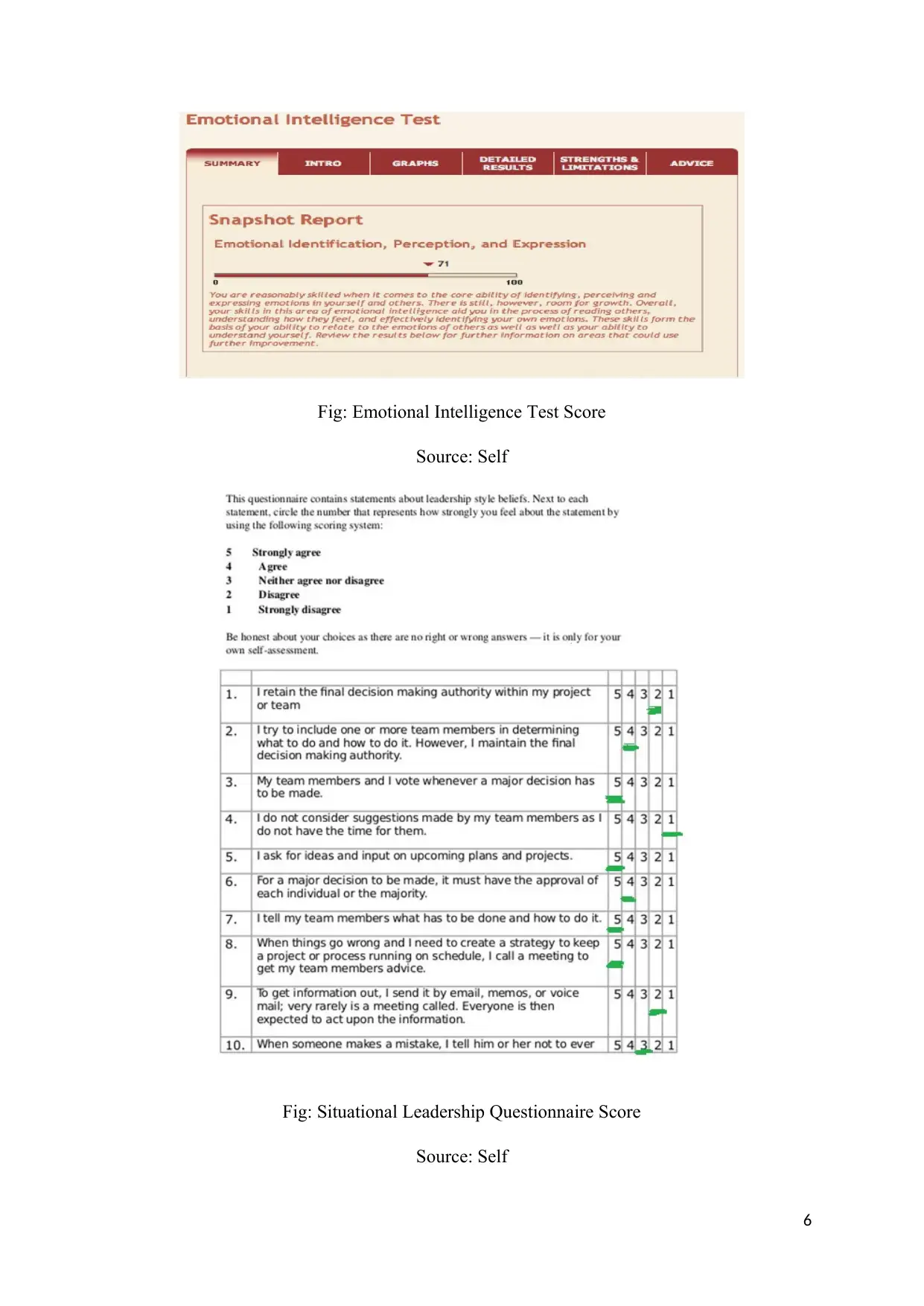
Fig: Emotional Intelligence Test Score
Source: Self
Fig: Situational Leadership Questionnaire Score
Source: Self
6
Source: Self
Fig: Situational Leadership Questionnaire Score
Source: Self
6
Paraphrase This Document
Need a fresh take? Get an instant paraphrase of this document with our AI Paraphraser
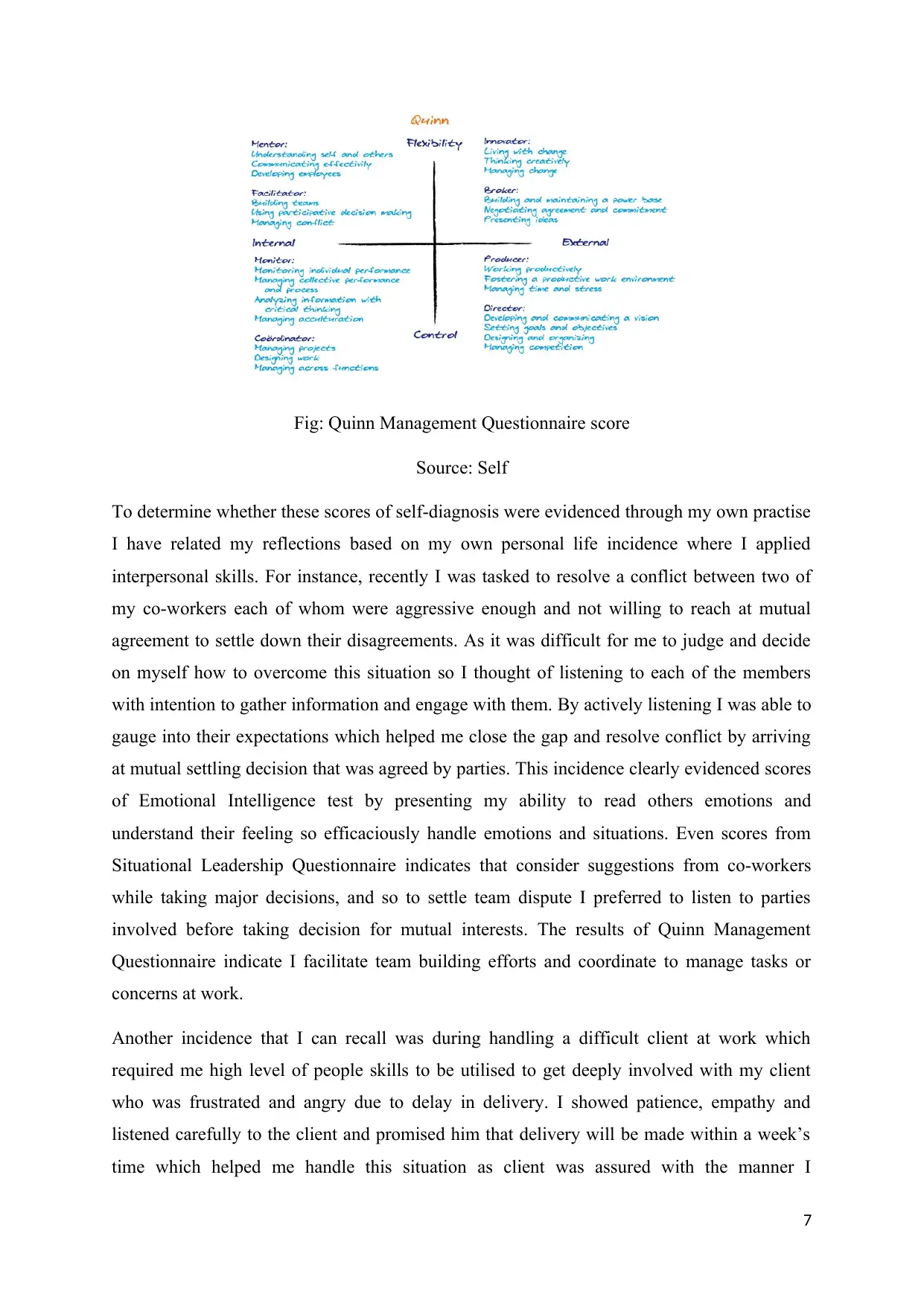
Fig: Quinn Management Questionnaire score
Source: Self
To determine whether these scores of self-diagnosis were evidenced through my own practise
I have related my reflections based on my own personal life incidence where I applied
interpersonal skills. For instance, recently I was tasked to resolve a conflict between two of
my co-workers each of whom were aggressive enough and not willing to reach at mutual
agreement to settle down their disagreements. As it was difficult for me to judge and decide
on myself how to overcome this situation so I thought of listening to each of the members
with intention to gather information and engage with them. By actively listening I was able to
gauge into their expectations which helped me close the gap and resolve conflict by arriving
at mutual settling decision that was agreed by parties. This incidence clearly evidenced scores
of Emotional Intelligence test by presenting my ability to read others emotions and
understand their feeling so efficaciously handle emotions and situations. Even scores from
Situational Leadership Questionnaire indicates that consider suggestions from co-workers
while taking major decisions, and so to settle team dispute I preferred to listen to parties
involved before taking decision for mutual interests. The results of Quinn Management
Questionnaire indicate I facilitate team building efforts and coordinate to manage tasks or
concerns at work.
Another incidence that I can recall was during handling a difficult client at work which
required me high level of people skills to be utilised to get deeply involved with my client
who was frustrated and angry due to delay in delivery. I showed patience, empathy and
listened carefully to the client and promised him that delivery will be made within a week’s
time which helped me handle this situation as client was assured with the manner I
7
Source: Self
To determine whether these scores of self-diagnosis were evidenced through my own practise
I have related my reflections based on my own personal life incidence where I applied
interpersonal skills. For instance, recently I was tasked to resolve a conflict between two of
my co-workers each of whom were aggressive enough and not willing to reach at mutual
agreement to settle down their disagreements. As it was difficult for me to judge and decide
on myself how to overcome this situation so I thought of listening to each of the members
with intention to gather information and engage with them. By actively listening I was able to
gauge into their expectations which helped me close the gap and resolve conflict by arriving
at mutual settling decision that was agreed by parties. This incidence clearly evidenced scores
of Emotional Intelligence test by presenting my ability to read others emotions and
understand their feeling so efficaciously handle emotions and situations. Even scores from
Situational Leadership Questionnaire indicates that consider suggestions from co-workers
while taking major decisions, and so to settle team dispute I preferred to listen to parties
involved before taking decision for mutual interests. The results of Quinn Management
Questionnaire indicate I facilitate team building efforts and coordinate to manage tasks or
concerns at work.
Another incidence that I can recall was during handling a difficult client at work which
required me high level of people skills to be utilised to get deeply involved with my client
who was frustrated and angry due to delay in delivery. I showed patience, empathy and
listened carefully to the client and promised him that delivery will be made within a week’s
time which helped me handle this situation as client was assured with the manner I
7
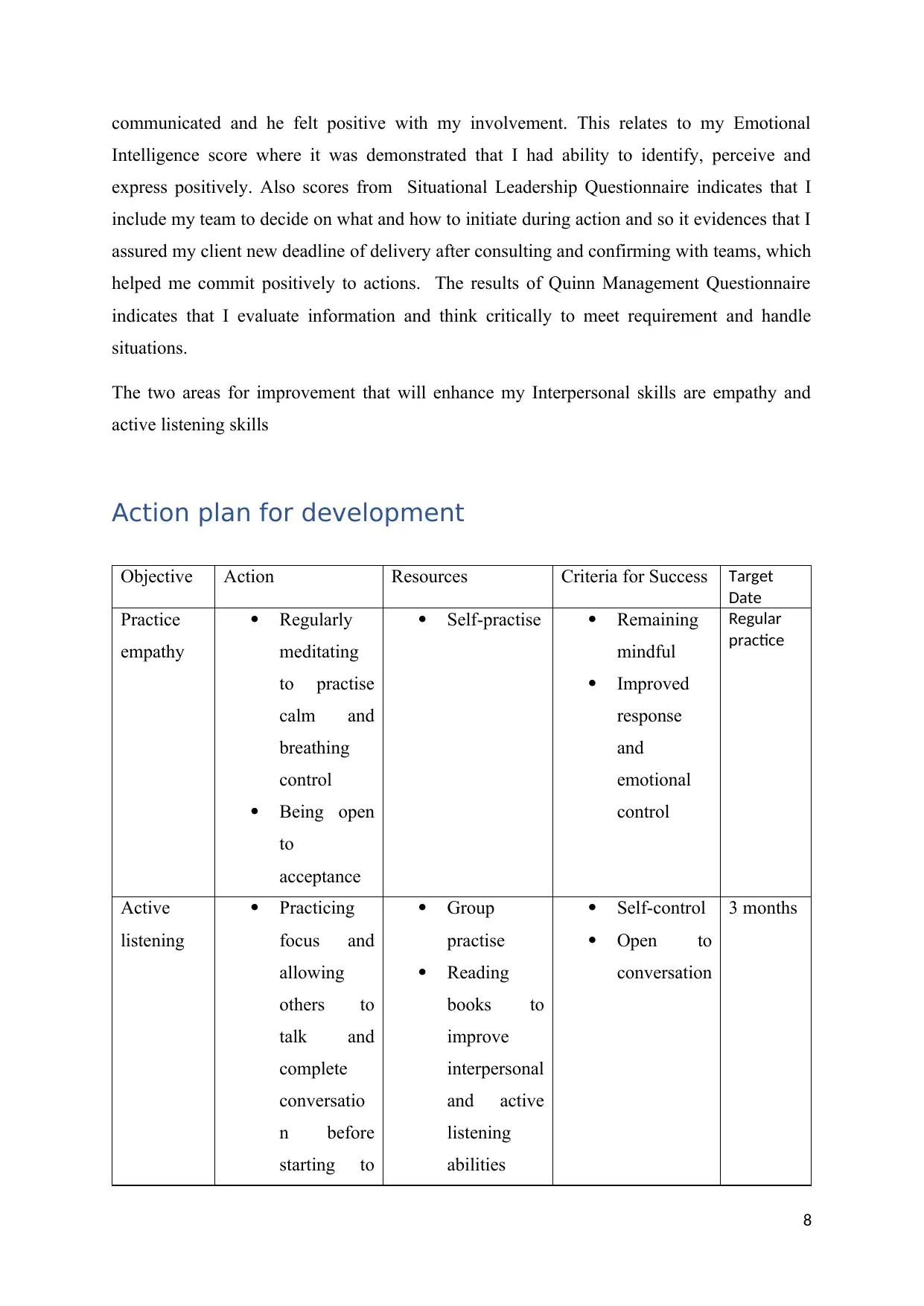
communicated and he felt positive with my involvement. This relates to my Emotional
Intelligence score where it was demonstrated that I had ability to identify, perceive and
express positively. Also scores from Situational Leadership Questionnaire indicates that I
include my team to decide on what and how to initiate during action and so it evidences that I
assured my client new deadline of delivery after consulting and confirming with teams, which
helped me commit positively to actions. The results of Quinn Management Questionnaire
indicates that I evaluate information and think critically to meet requirement and handle
situations.
The two areas for improvement that will enhance my Interpersonal skills are empathy and
active listening skills
Action plan for development
Objective Action Resources Criteria for Success Target
Date
Practice
empathy
Regularly
meditating
to practise
calm and
breathing
control
Being open
to
acceptance
Self-practise Remaining
mindful
Improved
response
and
emotional
control
Regular
practice
Active
listening
Practicing
focus and
allowing
others to
talk and
complete
conversatio
n before
starting to
Group
practise
Reading
books to
improve
interpersonal
and active
listening
abilities
Self-control
Open to
conversation
3 months
8
Intelligence score where it was demonstrated that I had ability to identify, perceive and
express positively. Also scores from Situational Leadership Questionnaire indicates that I
include my team to decide on what and how to initiate during action and so it evidences that I
assured my client new deadline of delivery after consulting and confirming with teams, which
helped me commit positively to actions. The results of Quinn Management Questionnaire
indicates that I evaluate information and think critically to meet requirement and handle
situations.
The two areas for improvement that will enhance my Interpersonal skills are empathy and
active listening skills
Action plan for development
Objective Action Resources Criteria for Success Target
Date
Practice
empathy
Regularly
meditating
to practise
calm and
breathing
control
Being open
to
acceptance
Self-practise Remaining
mindful
Improved
response
and
emotional
control
Regular
practice
Active
listening
Practicing
focus and
allowing
others to
talk and
complete
conversatio
n before
starting to
Group
practise
Reading
books to
improve
interpersonal
and active
listening
abilities
Self-control
Open to
conversation
3 months
8
⊘ This is a preview!⊘
Do you want full access?
Subscribe today to unlock all pages.

Trusted by 1+ million students worldwide
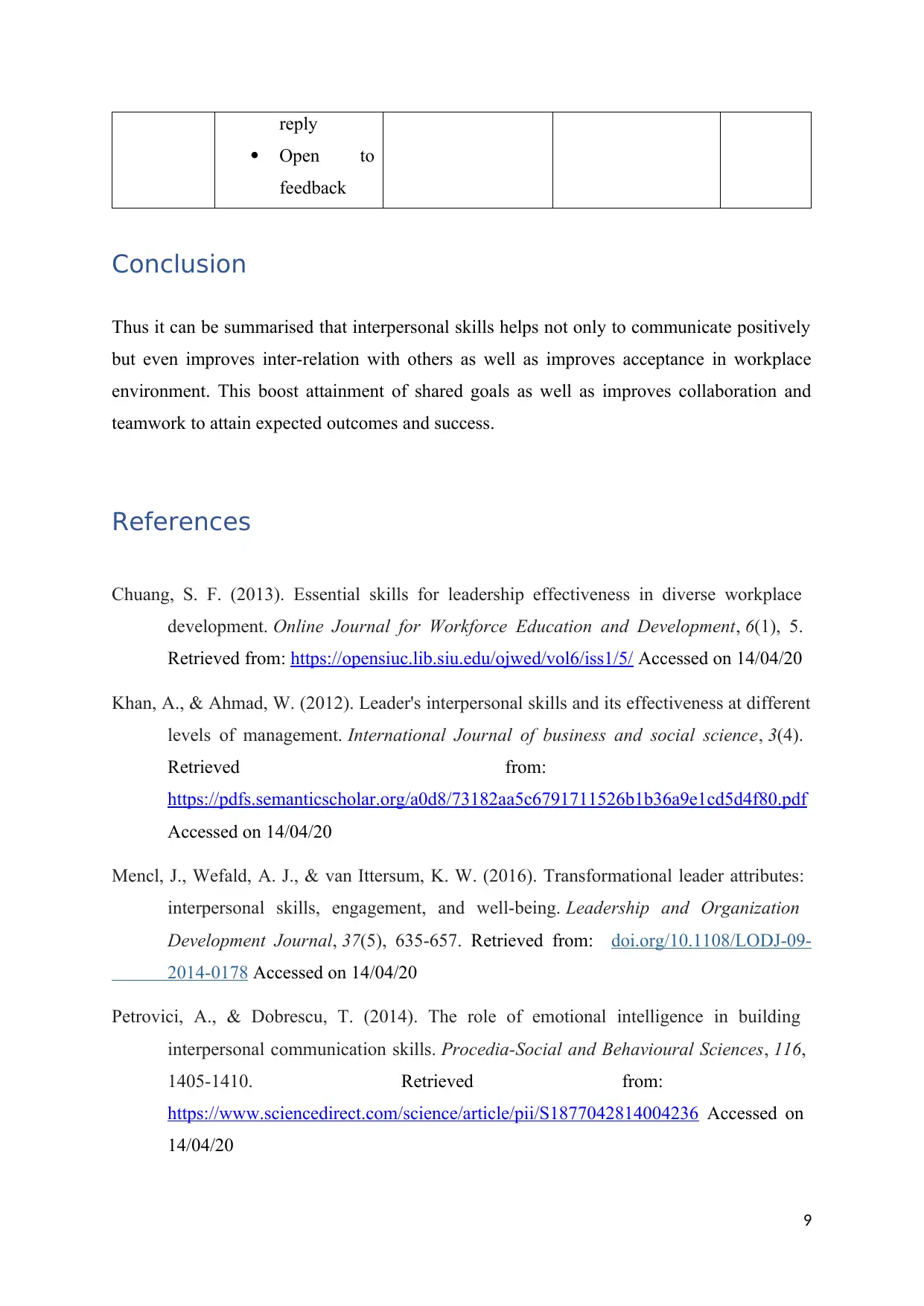
reply
Open to
feedback
Conclusion
Thus it can be summarised that interpersonal skills helps not only to communicate positively
but even improves inter-relation with others as well as improves acceptance in workplace
environment. This boost attainment of shared goals as well as improves collaboration and
teamwork to attain expected outcomes and success.
References
Chuang, S. F. (2013). Essential skills for leadership effectiveness in diverse workplace
development. Online Journal for Workforce Education and Development, 6(1), 5.
Retrieved from: https://opensiuc.lib.siu.edu/ojwed/vol6/iss1/5/ Accessed on 14/04/20
Khan, A., & Ahmad, W. (2012). Leader's interpersonal skills and its effectiveness at different
levels of management. International Journal of business and social science, 3(4).
Retrieved from:
https://pdfs.semanticscholar.org/a0d8/73182aa5c6791711526b1b36a9e1cd5d4f80.pdf
Accessed on 14/04/20
Mencl, J., Wefald, A. J., & van Ittersum, K. W. (2016). Transformational leader attributes:
interpersonal skills, engagement, and well-being. Leadership and Organization
Development Journal, 37(5), 635-657. Retrieved from: doi.org/10.1108/LODJ-09-
2014-0178 Accessed on 14/04/20
Petrovici, A., & Dobrescu, T. (2014). The role of emotional intelligence in building
interpersonal communication skills. Procedia-Social and Behavioural Sciences, 116,
1405-1410. Retrieved from:
https://www.sciencedirect.com/science/article/pii/S1877042814004236 Accessed on
14/04/20
9
Open to
feedback
Conclusion
Thus it can be summarised that interpersonal skills helps not only to communicate positively
but even improves inter-relation with others as well as improves acceptance in workplace
environment. This boost attainment of shared goals as well as improves collaboration and
teamwork to attain expected outcomes and success.
References
Chuang, S. F. (2013). Essential skills for leadership effectiveness in diverse workplace
development. Online Journal for Workforce Education and Development, 6(1), 5.
Retrieved from: https://opensiuc.lib.siu.edu/ojwed/vol6/iss1/5/ Accessed on 14/04/20
Khan, A., & Ahmad, W. (2012). Leader's interpersonal skills and its effectiveness at different
levels of management. International Journal of business and social science, 3(4).
Retrieved from:
https://pdfs.semanticscholar.org/a0d8/73182aa5c6791711526b1b36a9e1cd5d4f80.pdf
Accessed on 14/04/20
Mencl, J., Wefald, A. J., & van Ittersum, K. W. (2016). Transformational leader attributes:
interpersonal skills, engagement, and well-being. Leadership and Organization
Development Journal, 37(5), 635-657. Retrieved from: doi.org/10.1108/LODJ-09-
2014-0178 Accessed on 14/04/20
Petrovici, A., & Dobrescu, T. (2014). The role of emotional intelligence in building
interpersonal communication skills. Procedia-Social and Behavioural Sciences, 116,
1405-1410. Retrieved from:
https://www.sciencedirect.com/science/article/pii/S1877042814004236 Accessed on
14/04/20
9
Paraphrase This Document
Need a fresh take? Get an instant paraphrase of this document with our AI Paraphraser
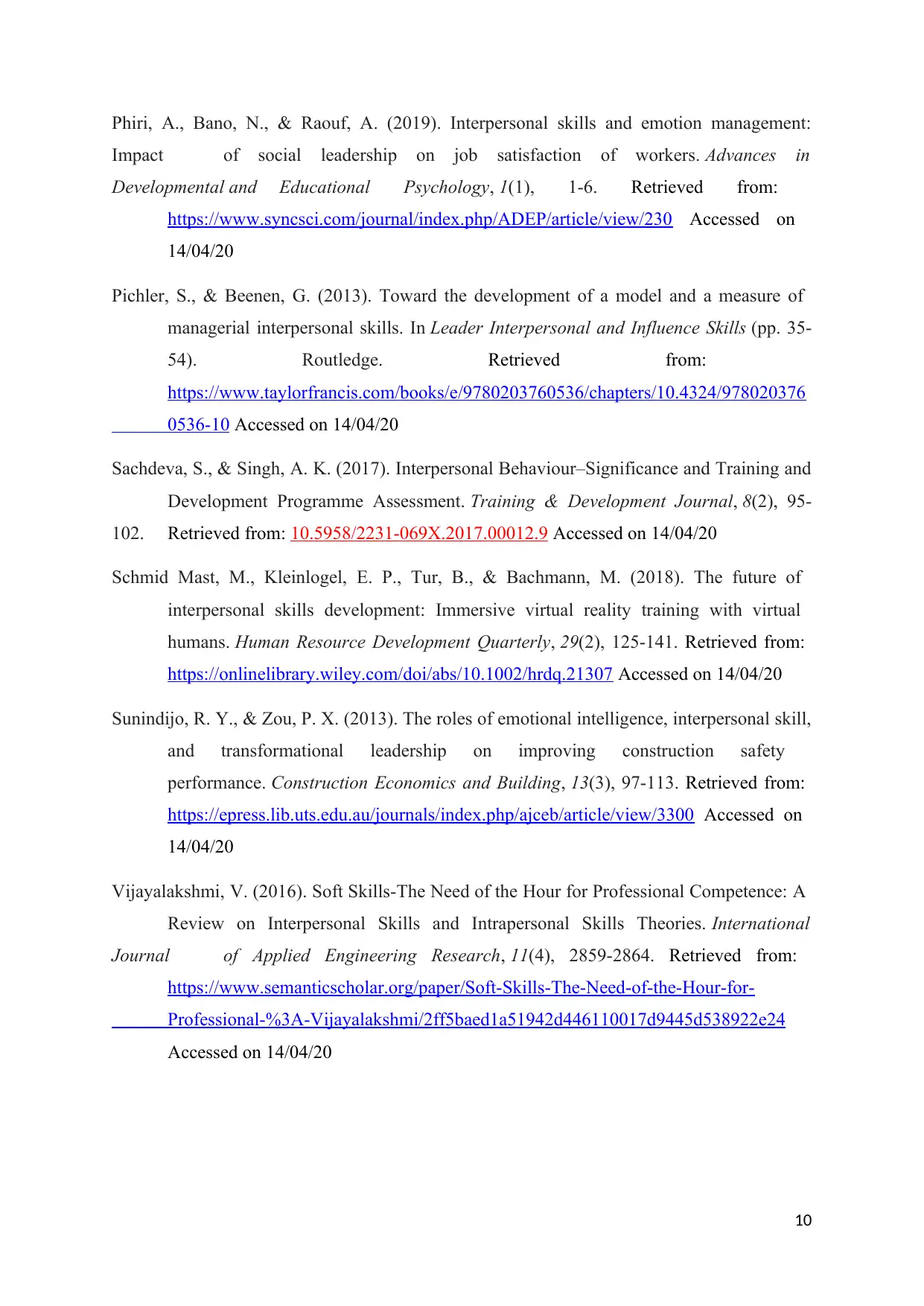
Phiri, A., Bano, N., & Raouf, A. (2019). Interpersonal skills and emotion management:
Impact of social leadership on job satisfaction of workers. Advances in
Developmental and Educational Psychology, 1(1), 1-6. Retrieved from:
https://www.syncsci.com/journal/index.php/ADEP/article/view/230 Accessed on
14/04/20
Pichler, S., & Beenen, G. (2013). Toward the development of a model and a measure of
managerial interpersonal skills. In Leader Interpersonal and Influence Skills (pp. 35-
54). Routledge. Retrieved from:
https://www.taylorfrancis.com/books/e/9780203760536/chapters/10.4324/978020376
0536-10 Accessed on 14/04/20
Sachdeva, S., & Singh, A. K. (2017). Interpersonal Behaviour–Significance and Training and
Development Programme Assessment. Training & Development Journal, 8(2), 95-
102. Retrieved from: 10.5958/2231-069X.2017.00012.9 Accessed on 14/04/20
Schmid Mast, M., Kleinlogel, E. P., Tur, B., & Bachmann, M. (2018). The future of
interpersonal skills development: Immersive virtual reality training with virtual
humans. Human Resource Development Quarterly, 29(2), 125-141. Retrieved from:
https://onlinelibrary.wiley.com/doi/abs/10.1002/hrdq.21307 Accessed on 14/04/20
Sunindijo, R. Y., & Zou, P. X. (2013). The roles of emotional intelligence, interpersonal skill,
and transformational leadership on improving construction safety
performance. Construction Economics and Building, 13(3), 97-113. Retrieved from:
https://epress.lib.uts.edu.au/journals/index.php/ajceb/article/view/3300 Accessed on
14/04/20
Vijayalakshmi, V. (2016). Soft Skills-The Need of the Hour for Professional Competence: A
Review on Interpersonal Skills and Intrapersonal Skills Theories. International
Journal of Applied Engineering Research, 11(4), 2859-2864. Retrieved from:
https://www.semanticscholar.org/paper/Soft-Skills-The-Need-of-the-Hour-for-
Professional-%3A-Vijayalakshmi/2ff5baed1a51942d446110017d9445d538922e24
Accessed on 14/04/20
10
Impact of social leadership on job satisfaction of workers. Advances in
Developmental and Educational Psychology, 1(1), 1-6. Retrieved from:
https://www.syncsci.com/journal/index.php/ADEP/article/view/230 Accessed on
14/04/20
Pichler, S., & Beenen, G. (2013). Toward the development of a model and a measure of
managerial interpersonal skills. In Leader Interpersonal and Influence Skills (pp. 35-
54). Routledge. Retrieved from:
https://www.taylorfrancis.com/books/e/9780203760536/chapters/10.4324/978020376
0536-10 Accessed on 14/04/20
Sachdeva, S., & Singh, A. K. (2017). Interpersonal Behaviour–Significance and Training and
Development Programme Assessment. Training & Development Journal, 8(2), 95-
102. Retrieved from: 10.5958/2231-069X.2017.00012.9 Accessed on 14/04/20
Schmid Mast, M., Kleinlogel, E. P., Tur, B., & Bachmann, M. (2018). The future of
interpersonal skills development: Immersive virtual reality training with virtual
humans. Human Resource Development Quarterly, 29(2), 125-141. Retrieved from:
https://onlinelibrary.wiley.com/doi/abs/10.1002/hrdq.21307 Accessed on 14/04/20
Sunindijo, R. Y., & Zou, P. X. (2013). The roles of emotional intelligence, interpersonal skill,
and transformational leadership on improving construction safety
performance. Construction Economics and Building, 13(3), 97-113. Retrieved from:
https://epress.lib.uts.edu.au/journals/index.php/ajceb/article/view/3300 Accessed on
14/04/20
Vijayalakshmi, V. (2016). Soft Skills-The Need of the Hour for Professional Competence: A
Review on Interpersonal Skills and Intrapersonal Skills Theories. International
Journal of Applied Engineering Research, 11(4), 2859-2864. Retrieved from:
https://www.semanticscholar.org/paper/Soft-Skills-The-Need-of-the-Hour-for-
Professional-%3A-Vijayalakshmi/2ff5baed1a51942d446110017d9445d538922e24
Accessed on 14/04/20
10
1 out of 11
Related Documents
Your All-in-One AI-Powered Toolkit for Academic Success.
+13062052269
info@desklib.com
Available 24*7 on WhatsApp / Email
![[object Object]](/_next/static/media/star-bottom.7253800d.svg)
Unlock your academic potential
Copyright © 2020–2026 A2Z Services. All Rights Reserved. Developed and managed by ZUCOL.





